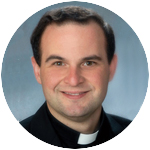
Father Eric J. Banecker
As the world huddles together (but at a safe distance!) to combat the scourge of COVID-19, the church has had to respond to these challenges quickly and with prudence. No decision will make everyone happy, and hindsight is always 20/20.
And while we should never get “used” to not having public celebration of the sacraments, neither should we ever again take such things for granted.
Cardinal George Pell, released from prison this week, was (unjustly, by all accounts) unable to celebrate Mass for many months. In China and other places where Christians are persecuted, attending Mass can land a person in jail. In parts of the Amazon, as discussed at the recent synod, communities of Catholics go without Mass for months at a time due to a lack of priests. And, as discussed at previous synods, many Catholics find themselves in very complicated marital situations that prevent them from receiving holy Communion.
[hotblock]
May the sudden revival of the practice of Spiritual Communion — a wonderful tradition of the church — remind us to pray for people in such challenging situations.
There is a silver lining to everything, and history has certainly shown that world crises can become the impetus to great development both in the church and in the wider world. For instance, parishes and institutions have had to update their digital strategies in a hurry.
Ministry has had to move away from our traditional focus on large gatherings and has had to focus on relational, almost one-to-one ministry. Practices such as family prayer, meditation on the Word of God, and adoration of the Blessed Sacrament have provided great consolation to the faithful at this time.
One of the questions that has arisen in the wake of this crisis has been the notion of Mass celebrated without our normal congregations. In this current climate, it certainly seems prudent to follow the guidance of government agencies which warn against large gatherings of people. This is not, as some have speculated, a back-door method of religious persecution. It is a temporary response to an emergency situation.
Yet as Catholics, we are uniquely equipped for such a moment. We are those who proclaim the sacraments to take place ex opere operato. That means that the sacraments truly take place as long as they are celebrated properly and with the intention to do what the church does.
[tower]
A marriage is valid whether there are 600 people present or 6. The bread and wine at Mass become the Body and Blood of Christ whether it’s the Christmas Eve Mass at 4 p.m. or whether it’s just an elderly monk and an altar server at a small altar.
When the Eucharist is celebrated, the whole church is present in mystery (that is, sacramentally), including those who have gone before us marked with the sign of faith. Even if we cannot be physically present at Mass for a legitimate reason, the sacraments still take place, as St. Augustine said, “within us without us.”
Some have speculated that this temporary, extreme situation will lead many Catholics to forgo Sunday Mass attendance in the future, thinking that watching it online will be “good enough.” But I think it’s equally likely that the opposite will be true. Perhaps the temporary inability to attend Mass will inspire many to go more frequently and with greater fervor than before.
Maybe this strange Holy Week without the faithful present will inspire priests to renew their commitment to the pastoral care of their people. The central message of Good Friday is that God can bring the greatest good out of seemingly horrible situations. Who is to say he isn’t doing this in our day?
Just as we were all there, mysteriously, on that first Good Friday, so all the faithful are mysteriously present at Mass, even when the pews are empty. That’s why there’s no such thing as a private Mass. That’s why, even in the era of lockdowns, I can say with confidence that, until we are united together again physically, I’ll see you in the Eucharist.
***
Father Eric J. Banecker is parochial vicar at St. Pius X Parish, Broomall.
PREVIOUS: A crisis of coping: Staying emotionally, spiritually healthy at home
NEXT: God’s got us, and the world, in his hands


Share this story